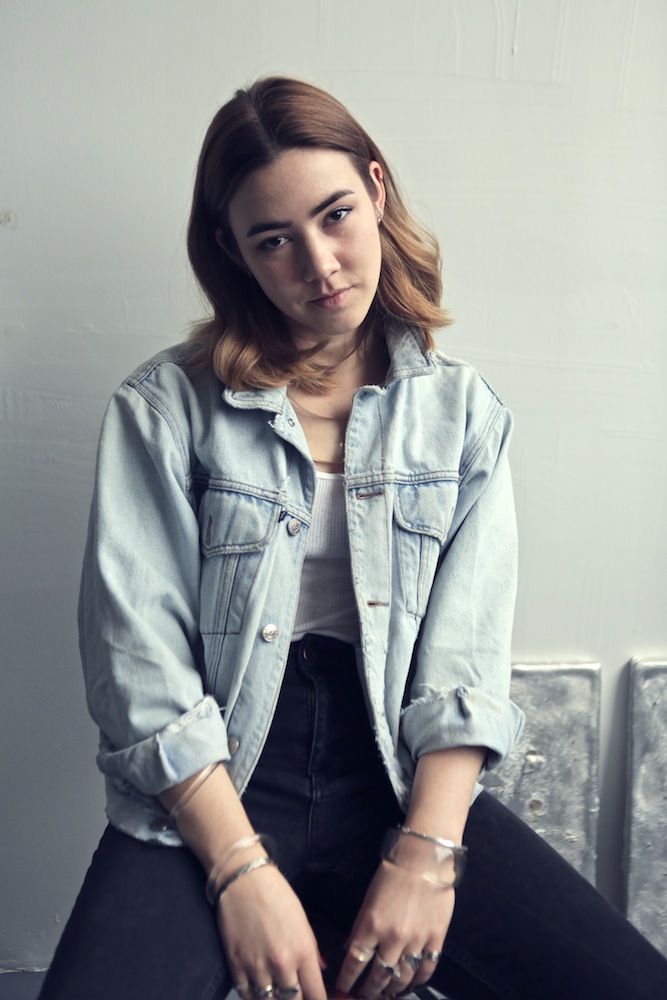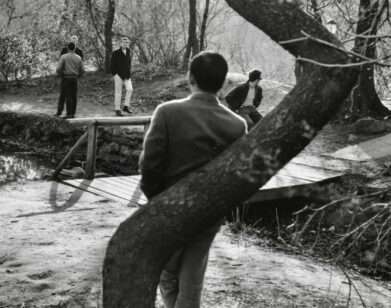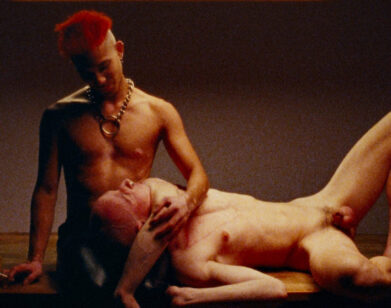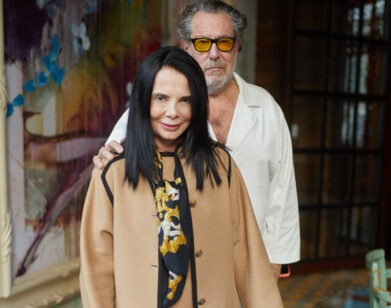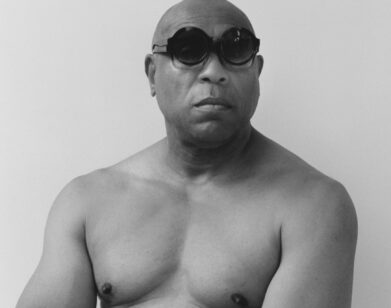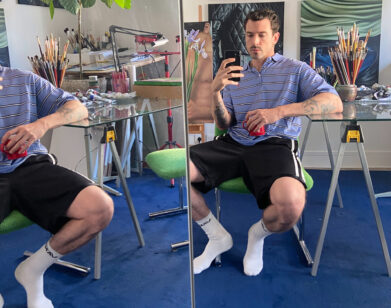The Cinematic Sculptress
Do not mistake Elaine Cameron-Weir’s shyness for lack of confidence. A self-proclaimed introvert, the Alberta-born artist is not the sort who needs to shout to be heard, largely because her work tends to speak for itself. Her sculptures, which range from brass plants to scented neon signs, exude a futuristic quality—like props from a dystopian film—and have captured the attention of many a sought-after gallery, including the Lower East Side’s Ramiken Crucible. Known for discovering rising talent, the gallery has already presented two well-received solo shows by Cameron-Weir, the second of which she cites as an artistic milestone.
Though her boyfriend and frequent collaborator, Ben Schumacher, was featured in our “13 Faces of 2013,” 2014 belongs to Cameron-Weir. With a third solo exhibition on the calendar at Ramiken, her second at Galerie Rodolphe Janssen in Brussels, and plans to show at next year’s Frieze (with Ramiken, naturally), it is evident Cameron-Weir needn’t boast to garner attention.
ALLYSON SHIFFMAN: What was it like growing up in Alberta? I’m Canadian, but I don’t know anyone from Alberta.
ELAINE CAMERON-WEIR: [laughs] I guess a lot of the people that I know from Canada who live in New York are from the east. Alberta is like the Texas of Canada —that’s what people call it—because of all the oil money and because it’s relatively conservative. But it’s really beautiful, and growing up there was good. My parents owned a greenhouse, so I just ran around there.
SHIFFMAN: Your parents own a greenhouse? That’s unusual.
CAMERON-WEIR: They used to. They were there every day for 12 hours, and I would just hang out with them when I was a kid.
SHIFFMAN: It’s interesting that the plant motif has made it back into your artwork.
CAMERON-WEIR: You know, it’s weird, I never really realized that connection. Somebody else asked me what my parents did and I mentioned the greenhouse thing and then went…. Oh. [laughs] I had a lot of other reasons of why I had just done the brass plants, it was funny that I didn’t realize that I had just been growing up around plants.
SHIFFMAN: So your parents must have been quite creative. Were they supportive of you going into the arts, or did they want you to get a “real job?”
CAMERON-WEIR: They were completely supportive. When I was a kid growing up, my mom always put me in art classes—I think she wanted me to be an artist. I always kind of thought that I would make art. Once I sold a couple things I realized that I could support myself, which was something I wasn’t certain of.
SHIFFMAN: I want to talk to you about materials. How do you decide what materials to work with?
CAMERON-WEIR: I figure out what I want to make and then that figures the material. Although certain things, like found things, that’s more complex. It has to be something that really affects me.
SHIFFMAN: The other evening you mentioned you’re going to Miami to get something weird…
CAMERON-WEIR: It’s a giant clamshell. It’s for a piece. I kind of have a plan for it, but I’m not really sure yet.
SHIFFMAN: Where did you find it?
CAMERON-WEIR: On eBay. I don’t even know how to describe it. It’s just a huge clamshell—it weighs 120 lbs. I need to figure out how to get it from Miami to New York.
SHIFFMAN: Where do you start in your process? Do you start on paper?
CAMERON-WEIR: No, I have a really bad sketchbook. I tend to think about things a lot. I’m constantly thinking about art. I don’t need to write everything down, because if something is important enough, I’ll just remember it. It’s the things that I think about the most that are the things I make. I usually draw to figure out logistical things, not so much to solidify ideas.
SHIFFMAN: Do you share ideas with anyone?
CAMERON-WEIR: I talk about things when people ask, but I kind of like to keep it to myself. I’m a complete introvert, so I don’t need to hash things out with other people. Of course, if I’m really excited about an idea I’ll talk about it with people who are close to me.
SHIFFMAN: The word “prop” comes up a lot surrounding your work—so much of what you do has a cinematic quality. Are you inspired by film?
CAMERON-WEIR: I am, but I’m not a film buff. I’ve seen barely any movies. [laughs] One of my biggest inspirations is going to the flea market in Hell’s Kitchen. It’s like a weird history display. You have stuff from every era, some of it is really shitty, some of it is really good. I like that mix and the clumping together of different historical periods.
SHIFFMAN: Would you call yourself a perfectionist?
CAMERON-WEIR: No [laughs].
SHIFFMAN: No? That surprises me.
CAMERON-WEIR: It always surprises me when people say that things are well made… not that they’re not well made, but they’re not perfect. And saying they’re not perfect is not me being a perfectionist…
SHIFFMAN: A perfectionist would totally say that.
CAMERON-WEIR: I don’t consider myself to be one. If someone could observe me in my studio, I don’t think they’d call me a perfectionist. [laughs] A lot of the time I really don’t know what I’m doing, I’m just kind of figuring it out.
SHIFFMAN: How important is failure to your process?
CAMERON-WEIR: I don’t think I use failure as a tool—I’m not interested in it, but it happens. [laughs] If I consider something a failure, I’ll just throw it away.
SHIFFMAN: Tell me about Ben. How did the two of you meet and come to be working together?
CAMERON-WEIR: We met at NYU—I was a year ahead of him. We started dating and then we started working together. We shared a studio for a while. That’s the one that I just moved out of. Naturally we started making stuff together. I had bought this Jaguar—the car, not the cat—for a really transient sculpture in my grad show.
SHIFFMAN: What was the sculpture?
CAMERON-WEIR: It was parked on the curb outside the gallery for a few hours. It had white paint smeared on the hood and it was in a no-parking zone right in front of the window, which looked into the space where my work was. So I had this car, and it still ran, and I guess the plan was to drive it until it died. So we just started driving around and making sculptures that we could fit in the car from things that we found. We’d take pictures of [the sculptures] and it was just meant to exist in pictures on the Internet and then we just continued working together, whenever it feels right.
SHIFFMAN: And you’re still together?
CAMERON-WEIR: Yes.
SHIFFMAN: …But in separate studios.
CAMERON-WEIR: It was financial. I’ve always wanted a private studio. I know that I need to be alone to be the most productive.
SHIFFMAN: What does your new studio look like?
CAMERON-WEIR: It’s a big room with concrete floors, big windows, and some really big tropical plants. And everything is white. I just moved there in June, so it’s pretty clean still. It’s in Bushwick.
SHIFFMAN: Is there a time of day that you feel the most creative?
CAMERON-WEIR: After dark, for sure. I’m such a night worker. I’m trying to reverse it because it interferes with doing the rest of life.
SHIFFMAN: Are you an optimist or a pessimist?
CAMERON-WEIR: Outwardly I’m a pessimist but there is a part of me that is an extreme optimist.
SHIFFMAN: A secret optimist. In what ways are you outwardly pessimistic?
CAMERON-WEIR: I’m just really cynical about the world sometimes, but there are things that I believe in. I wouldn’t say one over the other, but I think maybe other people would perceive me as a pessimist.
SHIFFMAN: Did you ever have a fallback career?
CAMERON-WEIR: No.
SHIFFMAN: If you had to be doing something else, what would it be?
CAMERON-WEIR: I think I’d like being a doctor, but I don’t think I could get through the schooling.
SHIFFMAN: That’s radically different.
CAMERON-WEIR: A realistic answer is hard to give.
SHIFFMAN: What’s the best creative advice you’ve gotten recently?
CAMERON-WEIR: [long pause] I don’t have a therapist, so I don’t get advice there… My mom once told me that she thought I was the most determined person that she knew. That’s not really advice.
SHIFFMAN: What advice would you give yourself the year that you were moving to New York?
CAMERON-WEIR: Do a lot of crazy stuff. Get it out of your system. [laughs]
SHIFFMAN: You weren’t crazy enough?
CAMERON-WEIR: No, no, it’s not that… Everyone has this idea of New York that’s not from New York, and I think it might be good to sort of live that fantasy, for a few weeks at least.
SHIFFMAN: What else do you have coming up?
CAMERON-WEIR: I have a show at Ramiken in March—that will be my third show there. And I’m doing Frieze with them and then I’m doing another show next fall in Brussels.
For more of our 14 Faces of 2014, click here.

